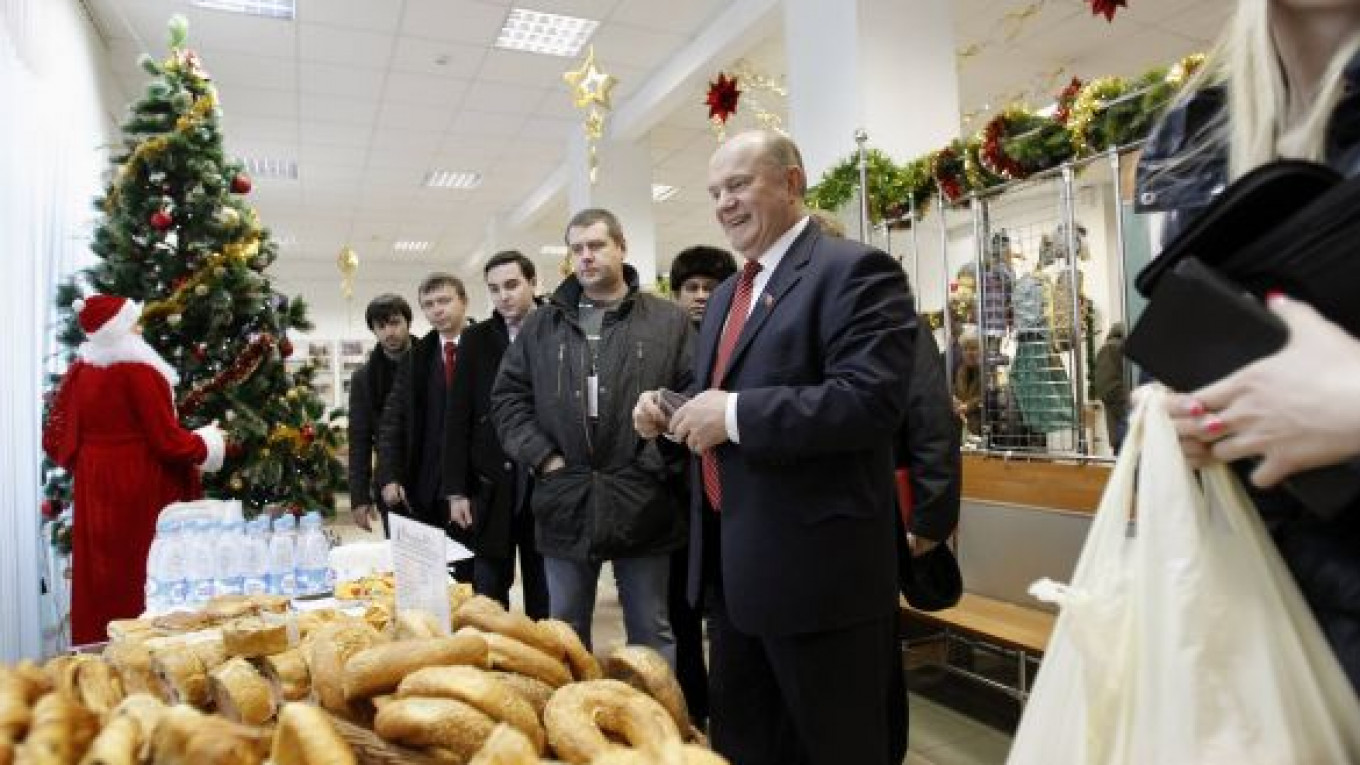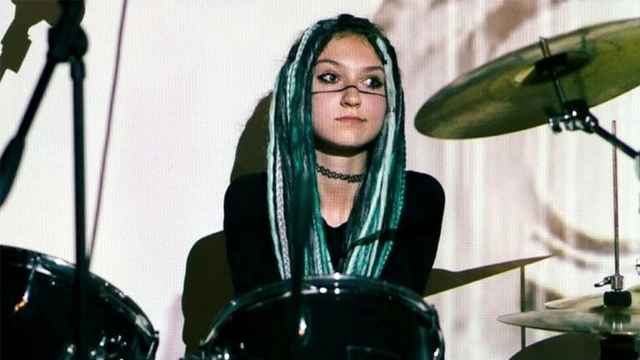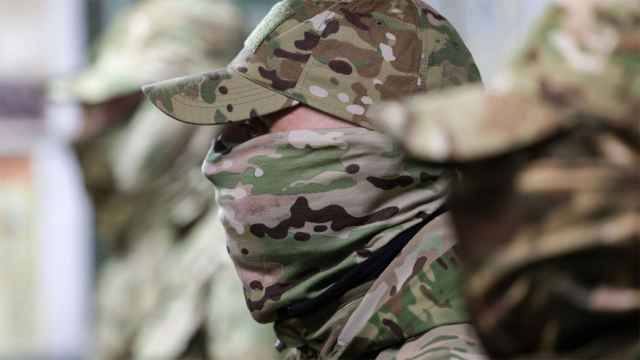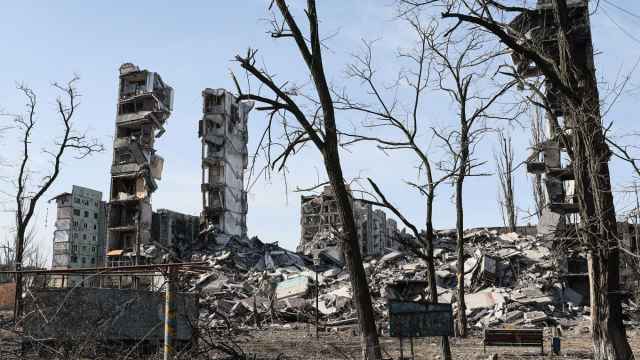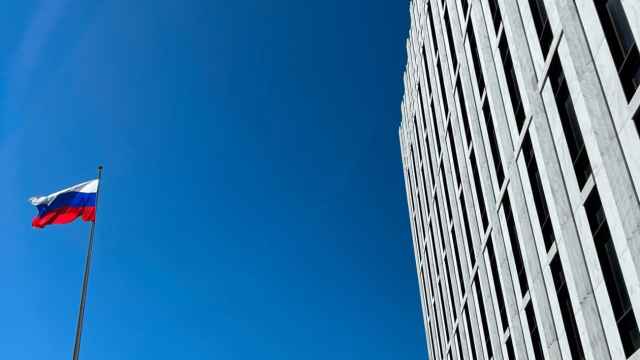With Yabloko expected to win less than 3 percent of Sunday's vote, there was little talk of election results at the liberal party's headquarters.
The threshold for entry to the Duma is 7 percent, and few party activists had any hope of a last-minute miracle. The emphasis instead was on catching and proving electoral violations.
Yabloko leader Sergei Mitrokhin told The Moscow Times that the atmosphere at headquarters was "business-like." He admitted that the party was "not the most popular" in Russia, and that there was a risk that they would end up with no representation in the Duma.
With voting winding down across Russia's nine time zones, Yabloko was not alone in focusing on accuracy and justice in the face of alleged unfair play by the ruling party. The Liberal Democrats, Communists and A Just Russia also coordinated efforts from their Moscow headquarters to facilitate a fair vote and expose violations.
Waving a handful of 43 ballots marked for United Russia that had been grabbed by party observers as someone tried to stuff them into a ballot box at Moscow polling station 961, Mitrokhin told journalists earlier that there was "nothing new in the voting process."
"If you don't go to the polls you are voting — but not with you own hands," he said.
As well as a "hotline" for election observers seeking advice on how to deal with violations, Yabloko was also operating 10 "mobile groups" — activists in cars — responding to the most serious problems.
Irina Nizhelskaya, 26, one of the 18 volunteers working from 7 a.m. until the early hours of Sunday morning taking hotline calls, said enquiries had been focused on people being forbidden from taking photographs, ballot stuffing and election observers being restricted access.
Yabloko's hotline was based in the attic of the party's headquarters on Pyatnitskaya Ulitsa, where the aging roof allowed Sunday's drizzle to leak in. Mobile groups were dispatched from a room that stank of human sweat in the bowels of the building.
But some voters were grateful for the help of the Yabloko volunteers dispatched to the scene of violations. Alexander Kachurin, 28, who had been arguing with officials for 40 minutes before the arrival of the mobile group, told The Moscow Times that polling station 64 had not allowed him to vote, despite the fact that he had completed all the required formalities associated with switching his polling station earlier in the week.
Yabloko activists Vadim Verin and Yelena Zakharova helped him fill out a complaint. Kachurin said their assistance had saved him a significant amount of time.
On leaving the site, Verin told The Moscow Times that they had been called to polling station 64 not by Yabloko's official observer, Nikolai Furik, who was present at the scene, but by another independent observer using the Yabloko hotline. The Yabloko observer, said Verin, had taken no action because he was the husband of a local election official. Furik had likely trained to become an official Yabloko representative with the intention of ensuring violations went unnoticed, he added.
Verin, who first worked for Yabloko in 1998 and is now a Duma deputy candidate for the party, said that if such violations could occur in Moscow under the noses of observers, the scale of electoral fraud was likely to be even higher in the regions. "It is not a battle between parties, but a battle for fair elections," he said.
Liberal Democratic Party of Russia
Now holding just 40 seats, or 8.9 percent of the vote in the State Duma, members of the Liberal Democratic Party of Russia appeared uncannily calm in the hours leading up to the close of the polls, while making some projections and accusations.
"Our prognoses state we will receive 30 percent to 35 percent of the votes," said Maxim Lebedev, the LDPR deputy director for youth affairs. "But as for the final results after all violations, that is a different matter."
Hardly a single party functionary could be found during the day of the elections at the headquarters of the LDPR — a party oriented toward the nationalist constituency and often accused of being in cahoots with the ruling party United Russia. In the absence of party representatives, journalists massed in the hallways and made the scene lively themselves.
The few party members present sat calmly discussing polling violations with the press and appeared as if the votes being counted hardly affected them. They were preoccupied spreading blue and yellow LDPR banners throughout the center so they would be visible later that evening during television broadcasts.
Either the party was content with its projections or reconciled in the face of the day's obstacles.
"The 2,500 observers spread throughout the country have seen cases of dumping extra ballots in voting boxes, individuals standing outside polling stations and paying people to vote a certain way. They are kicking our observers out of polling stations," Lebedev said. "Our votes are being stolen by the party in power — United Russia."
"Only once the votes are in will we know anything for sure," Lebedev said.
The Communist Party of the Russian Federation
Communist Party officials accused the ruling United Russia party of "mass falsification" of the vote across the country as voting drew to a close Sunday night.
"I can't say 'good evening' because there is nothing good about it," Ivan Melnikov, first deputy chairman of the Communist Party's central committee, told journalists Sunday evening. "The fact is we are facing falsification on a massive scale."
A tired-looking Melnikov said party activists had proof of electoral violations including "carousels" of students being bussed from one polling station to the next to vote multiple times, employees at state and privately owned businesses being instructed how to vote by their bosses and observers being barred from polling stations.
"These were not isolated incidents. We have seen violations of an organized, mass character," he said, adding that the party would seek criminal investigations into the incidents. He also denounced attacks against the web sites of liberal news sources and the Golos monitoring agency that resulted in a denial of service.
Melnikov and several colleagues were speaking in a packed, parquet-floored room at the party's headquarters — a two-building, fenced-in compound shaded by poplar trees and neighboring apartment blocks just off Tsvetnoi Bulvar.
The courtyard of the campaign center was crowded with party members and journalists sharing cigarettes.
Party officials claimed an exit poll at 6 p.m. showed the Communists with 36 percent of the vote in the Vladimir region, compared with United Russia's 33 percent.
The Communists traditionally come in second place to United Russia in the elections, and often attract protest votes from citizens who do not necessarily share the party's political position but see them as the strongest potential opposition to United Russia.
A straw poll of half a dozen voters leaving polling station number 64, just opposite the Communist Party's headquarters, on Sunday afternoon suggested that their party might have lost some of that protest vote to center-left A Just Russia. Three people told The Moscow Times that they had voted for A Just Russia, while just one said he had chosen the Communists.
A Just Russia
Just Russia candidates began trickling into the campaign headquarters at about 7 p.m., filling the hitherto tranquil space with tales of the day's efforts to secure fair play. Party chairman Sergei Mironov was not yet present at their headquarters on the seventh floor of 13 Tverskoi Bulvar.
Andrei Tumanov, an editor of a newspaper for dacha owners and a Duma candidate, was the first to arrive, sweating with agitation. He had spent the previous 2 1/2 hours watching in his car for any members of the pro-Kremlin youth movement Nashi, who, he said, might show up at his local polling station to try to rig the vote. They didn't.
"I would have told them a couple of nice words," said Tumanov, editor of Vashi Shest Sotok, using a euphemism for quarrelling.
Alexei Lebedev, a candidate who oversaw the party's anti-vote-rigging task force in the capital, said it included 800 cameramen traveling from polling station to station to film anything suspicious. It worked out to one camera to three or four stations in a city that has around 2,300 places to cast votes, he said.
Party lawyers, current State Duma deputies and candidates went out from various field offices throughout Moscow to try to stop any perceived violations, he said. These offices bore the brunt of the activity on election day.
"The closer to the ground, the more intense the situation," he said.



